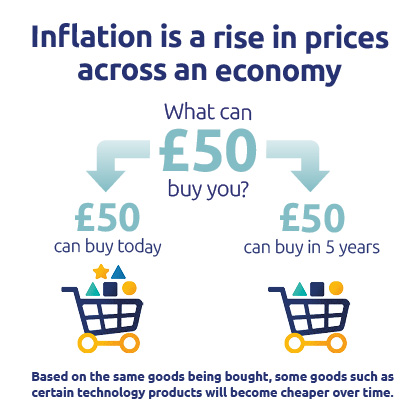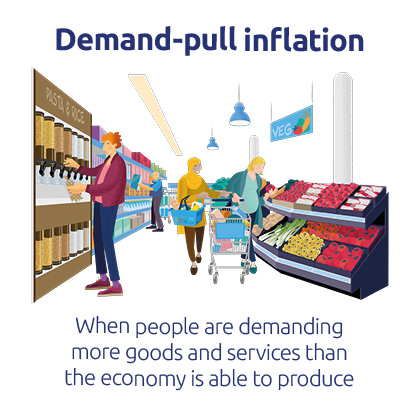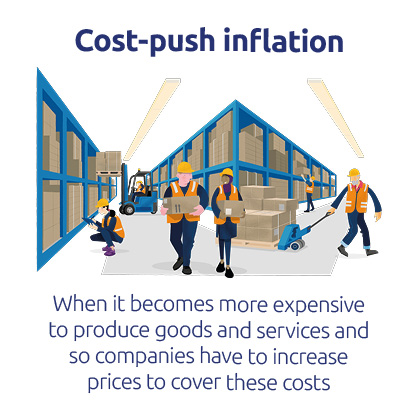Savings
What’s the outlook for UK inflation and will interest rates rise again?
Will UK interest rates increase again in March? Are the increases helping to lower inflation? Read our outlook to understand all things inflation and interest rates.

id
The Bank of England has been increasing UK interest rates to help manage soaring inflation. But after 10 rises in a row, will rates increase again in March? We help you understand all things inflation and interest rates and what it means for your money.
id
The Bank of England (BoE) has been increasing UK interest rates over the last year to help lower inflation. This has meant 10 hikes in a row to 4% (February 2023), and variable rate mortgage holders feeling most of the pain.
The big questions are: what’s going on with inflation and when will UK interest rate rises come to an end? We asked our colleagues at Phoenix Asset Management for their thoughts on inflation and interest rates.
Standard Life is part of Phoenix Group, the UK’s largest long-term savings and retirement business. We work closely with our colleagues at Phoenix Asset Management to determine the outlook for markets and the investment strategy for our pension solutions. They have provided the following views.
What is inflation?
Inflation is the rate of increase in the general price of goods and services. In other words, the cost of living. So, for example, if the rate of inflation is 5%, it means it’ll cost you 5% more to buy something today than it did a year ago.

id
There are a few different measures of inflation, but the one the government uses in its targets is the Consumer Prices Index (CPI). CPI tracks the price of a list of goods and services including food, clothing and household services but doesn’t include house prices or costs such as mortgage payments or rent. The BoE aims to keep CPI at 2%.
What causes inflation?
Mostly, the rate of inflation tends to rise when there’s not enough supply to meet the demand of consumers. When demand is high, it usually pushes up prices – called demand-pull inflation. But prices can also rise when it becomes more expensive to produce goods (such as higher energy costs) – known as cost-push inflation.


id
Events like the pandemic and the conflict in Ukraine have had a big impact on how easily we can access many of our essential goods and services, and the cost of producing them. Food, clothing and petrol are all areas where prices have increased.
In fact, the combination of supply problems and higher production costs pushed UK inflation to 11.1% in October 2022 – that’s a 41-year high.
Why are interest rate increases used to lower inflation?
By increasing interest rates, the BoE is aiming to encourage people to borrow less, save more and therefore spend less. This reduces demand for goods, which in turn should lead to prices falling.
But this can only work to help reduce demand-pull inflation and doesn’t have much impact on cost-push inflation, such as higher fuel prices following the conflict in Ukraine.
Where are we now?
CPI inflation has come down to 10.1% (the annual figure in January) mainly thanks to lower oil and gas prices and consumers spending less, especially over the Christmas period. But that’s still a long way from the BoE’s 2% target.
Managing inflation at any time is a difficult balancing act. But even more so as we’re all still managing the financial effects of the pandemic and a cost of living crisis. The BoE is aiming to increase interest rates enough to bring down inflation, but not so much as to push the economy into a deep recession.
Will interest rates go up again in March – and what about after that?
Yes, at Phoenix Asset Management, we expect the Bank’s Monetary Policy Committee (MPC) to make a 0.25% increase, taking rates to 4.25%, at its meeting on 23 March. This slows things down from the 0.5% increases we’ve been seeing.
We expect another 0.25% increase at their May meeting and for rates to then remain steady at 4.5%.
The MPC provides outlook guidance alongside all their decisions. And in February they softened this, removing the word ‘forceful’ from their description of what’s needed. In other words, we should see more moderate increases to rates in the future.
What’s the outlook for inflation?
Current inflation in the UK is 10.1% (the annual figure in January) but we expect it to fall to a bit below 4% by the end of this year. This is because the increases we’ve seen to prices for energy and other goods have already happened, so they won’t be taken into account when calculating this year’s inflation rates. However, the price of services could keep inflation higher for longer.
What it means for your money
There’s good and bad news. If the bank increases interest rates, it also means you’ll get higher rates paid by savings accounts (though there’s often quite a lag here) – so it’s good news for your cash savings. For younger people saving up a deposit for a house, this can help protect the value of their existing savings.
Meanwhile for a lot of retirees, the increase in savings rates can provide extra income to pay increasing bills such as heating. It’s also good news for people thinking of taking out an annuity, as higher interest rates can push up annuity rates and the level of secure income you can receive.
However, overall, with savings rates still below inflation, people are losing out in real terms. Then there’s the impact on borrowers. The higher the interest rate goes, the more you need to pay back on any money you’ve borrowed. So it’s been particularly painful for those people with a variable rate mortgage and those coming off a fixed rate deal, or those with debts. And with outgoings increasing, it may restrict their ability to borrow if their lender views their income insufficient to cover the repayments.
Higher mortgage payments are a big pressure on top of already high costs. Possibly a reason why more people have been dipping into their pensions recently. It’s understandably tempting to do so when you’re facing soaring mortgage costs. But it’s a huge decision that can greatly affect how much money you’ll have to live on in retirement and how long that will last. You can read about the key things to think about in Rising interest rates, your mortgage and your pension. If you’re struggling with money worries or managing your debt you can find help in our support hub.
The information in this article is based on our understanding in February 2023 and should not be regarded as financial advice.



